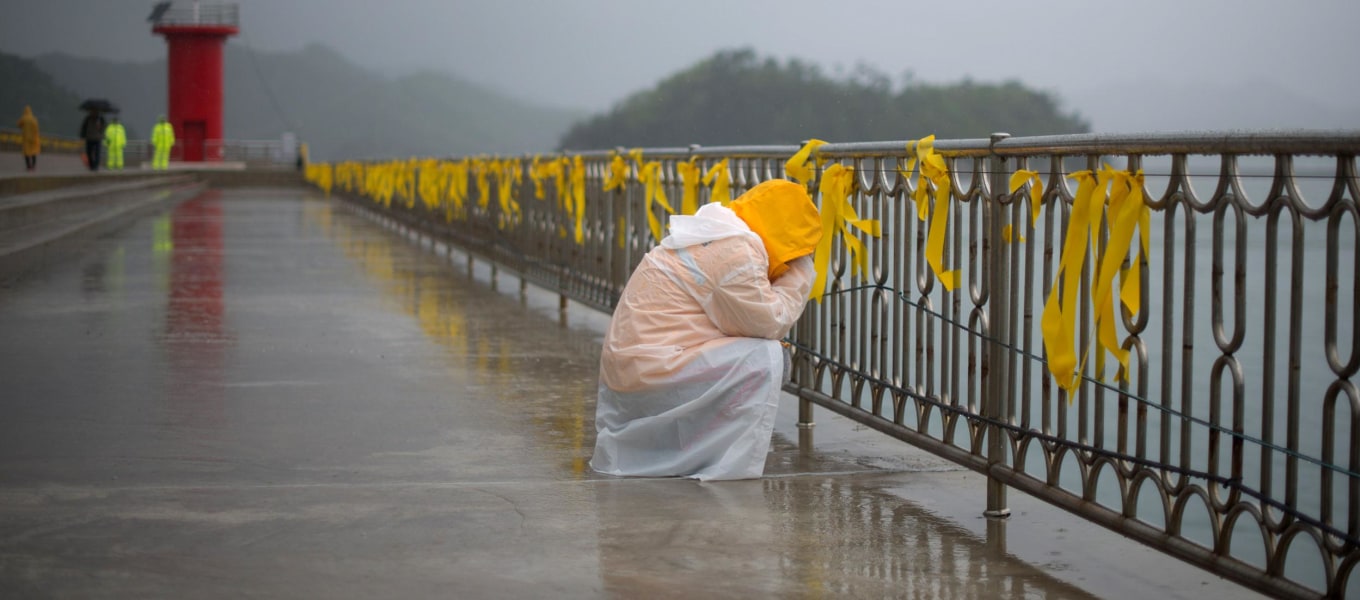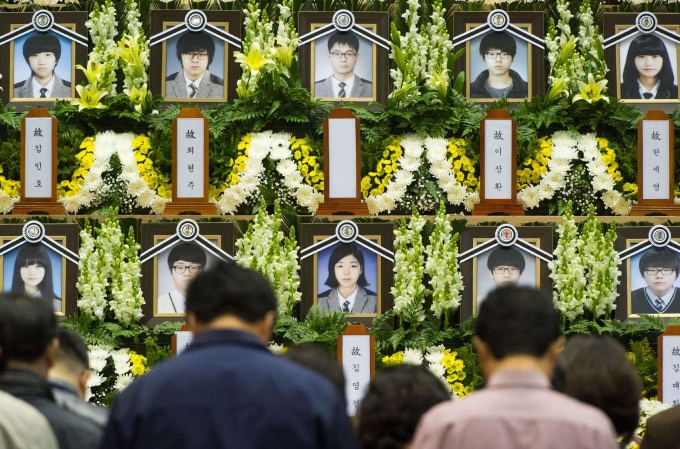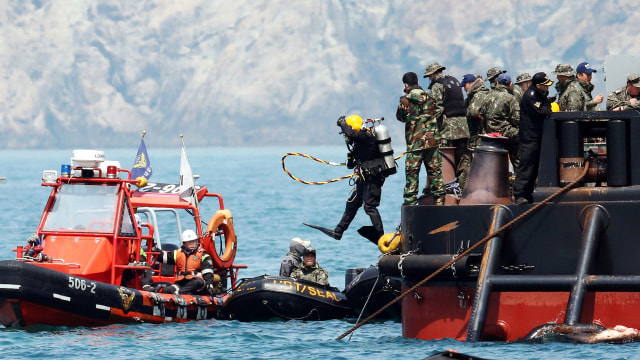The Grieving
"The Catholic undertaker volunteers were wiping the fingers and toes of the kids, ever so gently and carefully, as if they were bathing a baby."
"In the end, the kids became pretty again. I'm glad they met adults that they could be thankful to before leaving this world."
Jung Hye-shin, South Korean psychiatrist, Jindo, South Korea

They sit and they wait. They wail forlornly through the prevailing quiet shattering the solitude and peace of those quietly anguishing in their own grief, and then silence again prevails. There are no conversations, for there is nothing to say. If there were something to look forward to, something to give them the joy however, brief of hope, some animation might enter their haunted, hollow eyes, but there is nothing and so they say nothing.
They are drained, emotionally emptied of any anticipation of the future. For some, the future has died. For others the future will be a dim, dark void. For others, the future will represent coping as best they can. Time heals all wounds, we are informed, and perhaps it does, since time also brings the peace of not knowing, in death that will visit all living organisms. It was just that their time was too short, they were only, after all, still in their formative years.
 KIM DOO-HO / AFP - Getty Images People attend a memorial for the victims of the sunken South Korean ferry Sewol at the Ansan Olympic memorial hall on Thursday.
KIM DOO-HO / AFP - Getty Images People attend a memorial for the victims of the sunken South Korean ferry Sewol at the Ansan Olympic memorial hall on Thursday. What else accounts for the fact that over 16,200 people have arrived in Jindo, on their own or representing close to 730 organizations. And that 690,000 aid items representing food, bottled water, blankets and clothing have arrived in Jindo since the sinking of the Sewol ferry with most of the teenagers on board, trying desperately to save themselves, sending messages of love to their parents in their last farewells.
People in their hundreds, some from aid groups, from private companies, from churches and other civil social groups pack roads where white tents sit near Paengmok port and a gym on the island, offering soup, kimchee, rice, hamburgers, taxi services, cellphone battery charging, laundry services, medicine, energy drinks, psychiatric help and little thoughtful necessities like underwear, socks, cotton swabs, toothbrushes.
No one is charged for anything, these are goods and services representing the soul of the nation, a compassion that is as wide and as deep as the ocean that holds the remains of their loved ones. The grieving families are too numb to do anything for themselves; their apathy and sorrow have sapped them completely. And so, the volunteers are there, not so much speaking, but proffering whatever is needed; comforting, mourning also.
Huge pots of hot kimchee soup are prepared, blankets distributed, along with towels and toiletries. Trash is collected, the grounds swept. Cab drivers from Ansan, where the high school students had come from, provide free-of-charge drives to wherever anyone might wish to go. "It's time to help those who are mourning. Giving up several days of work is nothing", said driver Ahn Dae-soo.
The owner of a Japanese restaurant arrived in Jindo from Daejeon to cook traditional beef soup for the mourners. He also serves other volunteers and journalists. Lim Jang-young, 58, closed his restaurant to arrive in Jindo; unable to focus on his business interests while thinking about the victims and their families, he finds some measure of relief being there, doing what he can to help, hoping that what he offers will provide some salve for wounded souls.
A Buddhist monk approaches a weeping mother sitting on the edge of windblown dock. He wipes away the tears from her face as she gives full vent to her grief and her hopeless longing for her missing son. The monk, Bul Il, leads her away from the edge of the dock, and chants Buddhist scriptures, sounding a wooden gong in a prayer for her son's return.
"They are really suffering", he said. He had come from the port city of Busan to help the families still awaiting word that their missing children have been retrieved from the sunken vessel. "It's painful for me to watch their misery", he said. Volunteers are warned that they must be aware at all times of the potential for provoking a backlash from the mourners. They must not smile, nor engage in small talk, attempt to take photos.

Young people who come to volunteer are dissuaded from presenting themselves for their presence will evoke more pain as their very youth reminds the deprived parents of what they have lost. Volunteers who appear youthful are awarded tasks that will keep them behind scenes.
One volunteer who had driven from the southern city of Suncheon to clean toilets and shower rooms at a gym where the families sleep said: "It's totally different from when I watched this on TV. I've become really solemn. I can't really express how I'm feeling."
Labels: Disaster, Family, South Korea

0 Comments:
Post a Comment
<< Home